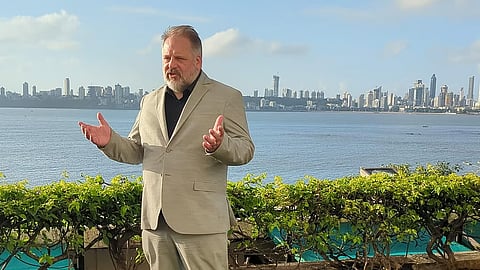
- News
- Campus
- Exam
- Podcast
- Web Stories
- Do You Know
- Path Finders - UG Programs
- Videos
- Élitscape

Half of London’s university graduates now want to start their businesses, but the UK’s startup culture could use a shot of Bengaluru’s energy, notes Howard Dawber, Deputy Mayor of London for Business & Growth, and Chair of London & Partners, reports Vidya Iyengar of The New Indian Express.
That’s one reason he sees India’s tech capital not just as a trade partner and beyond, but a source of inspiration. “If we could bottle some of that entrepreneurial spirit and bring it back, we absolutely would,” Dawber tells us over a cup of masala chai at The Taj West End, wrapping up his two-day visit to the city. His schedule in India was packed with a series of meetings with investors, being a keynote speaker and doing interviews, on the back of British Prime Minister Keir Starmer’s recent visit to India.
Beyond this buzz, Dawber takes stock of the pace of Bengaluru’s startup scene. “Not that we don’t have phenomenal innovation happening in London,” he clarifies. “But the pace at which people turn ideas into business here is really impressive and the energy of the place is [contagious],” he says.
Dawber points out the need to prepare the next generation of entrepreneurs, for which he feels youngsters in school need to be taught how to start and run businesses, because many of them now want to do just that. “The traditional career route of joining a big bank or corporation is no longer the default choice for UK graduates, unlike even 20 years ago,” he observes, adding, “India’s doing something right in that space and we want to learn from it.”
Talking of energy, he notes another form, this one quite in contrast to the first. During a two-hour car ride through city traffic, Dawber experienced first-hand the inefficiencies in daily commutes and the lost productivity that comes with it. “I saw a lot of people sitting in cars and wasting time. You cannot build a city of the future like Bengaluru already is – off the back of road transport,” he says, adding, “We’ve made progress in getting people out of cars and onto public transport or bikes.”
He cites the example of the Ultra Low Emission Zone (ULEZ) as a success story. The policy charges high-emission vehicles £15 a day to enter central London, while offering subsidies to help low-income residents switch to cleaner options. “We’ve spent £117 million helping people buy new, low-emission vans,” he says, adding, “As a result, we reached UN legal air quality levels 184 years earlier than in just nine years.”
With the US tightening its visa policies, he finds it an apt time to attract more Indian students. “There’s a massive opportunity now with the crackdown, which has been absolutely the mainstay of Silicon Valley for ages. There’s an opportunity there for us to take advantage of, which we absolutely should. So let’s be clear, we want our Indian friends who come to London to study, to stay on and be part of the economy,” he says.
As global barriers rise in some regions, Dawber says London is moving in the opposite direction, open to connection and collaboration, and Bengaluru is exactly the kind of place they want to do that with.
